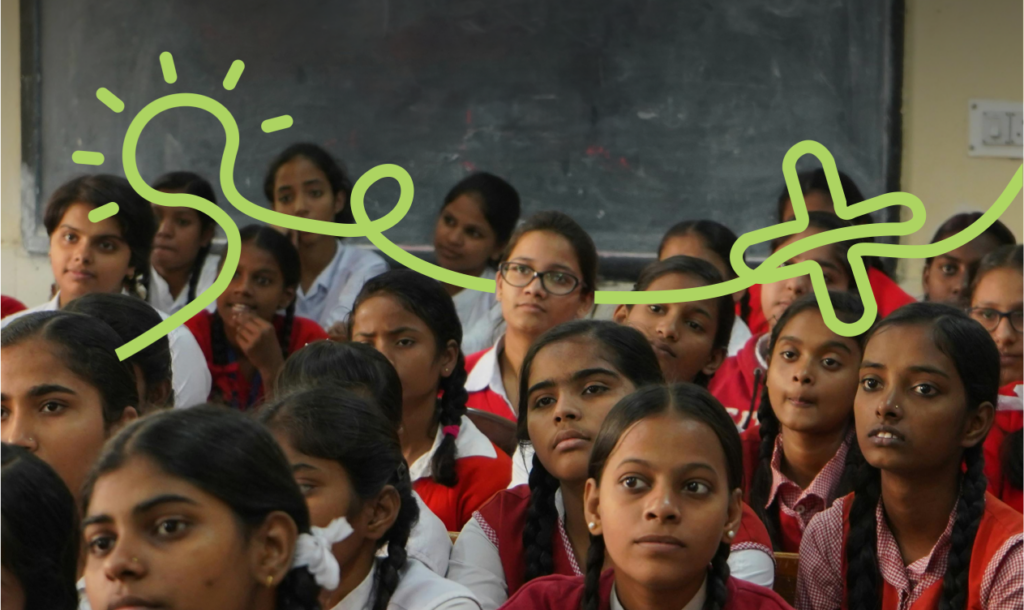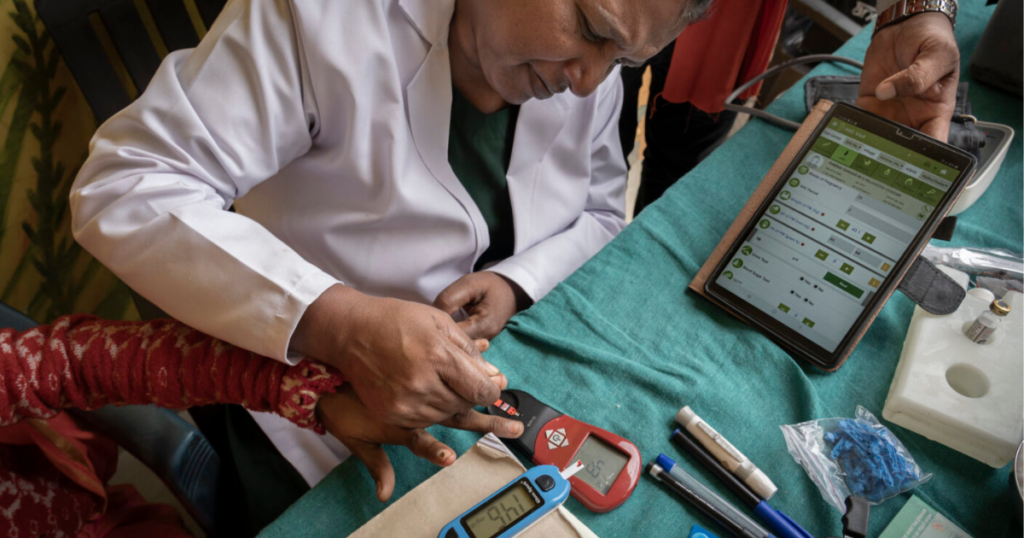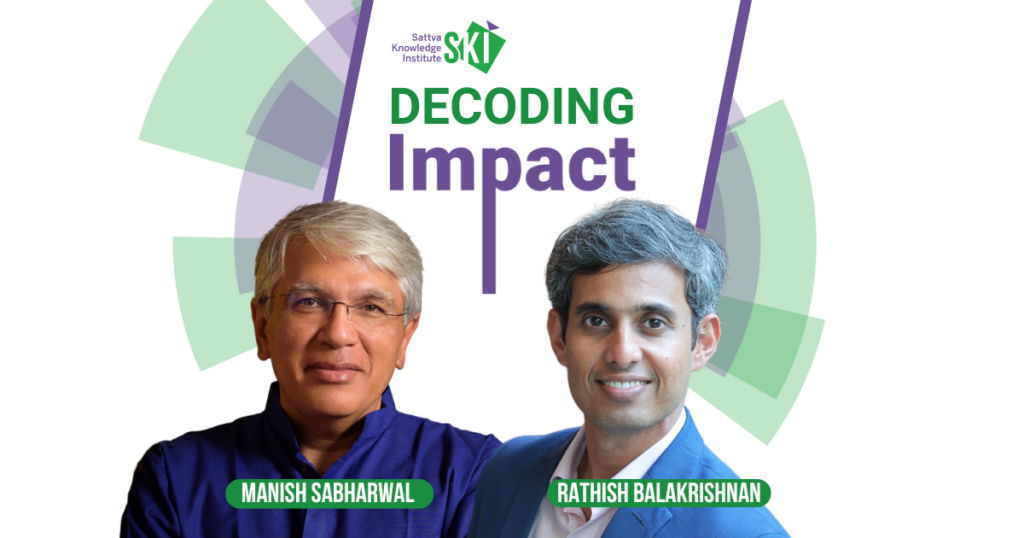STEM Skills: A tremendous opportunity
In an era driven by rapid technological advancements and digital transformation, Science, Technology, Engineering, and Mathematics (STEM) education has emerged as a cornerstone for economic development and societal progress. Globally, countries are investing in STEM education to equip their workforce with the necessary skills to thrive in the digital age. India’s core digital sectors are projected to generate between 60 to 65 million jobs by 2025, with many requiring STEM proficiencies.
However, a significant gender disparity exists in the field of STEM education, with female students 20% less likely to choose STEM subjects compared to their male counterparts. Investing in STEM education for girls has a significant impact on their economic and social empowerment. Equipping girls with STEM skills, enables their transition from low-skill jobs to secure and higher-paying positions, addressing the low female labour force participation rate in India. Formalising the female workforce has the potential to contribute $700 billion to India’s GDP by 2025, boosting economic growth by 1.4%.
Where does India lag behind?
Amidst the increasing digitalisation of the nation, an issue of a digital skill gap in remote and rural India, emerges, perpetuated by inequalities related to physical access to ICT, low literacy, low economic status and inadequate social and health awareness.
Lower literacy levels of women in India, as compared to men, act as the first barrier to access. But even when adolescent girls can access the digital ecosystem, their engagement times remain abysmally low, with more than 83% of girls getting less than an hour of computer time per week.

There also are notable geographic disparities, such as the rural-urban and North-South divide in digital proficiency. The rural-urban gap is also evident as the majority of ICT-literate youth belong to urban areas.

With India accounting for nearly half of the global gender digital gap, the consequences of inaction are substantial.
Ongoing Efforts
Several actors in the ecosystem are implementing potentially scalable initiatives, to bridge the digital divide for girls in India. These seek to address one or more of the levers – accessibility, affordability, fundamental and specialised digital skills, digital literacy and digital citizenship – that facilitate the development of STEM skills among girls.
The Pi Jam Foundation aims to provide affordable and high-quality computer science education to students and educators across under-resourced schools through a systems approach by working across all levels of the education ecosystem through its intervention. Their systems approach supports the students through teacher capacity building, open-source and low-cost tools and works towards a shift in computer science education at policy levels.
Pi Jam offers contextually curated curriculum and co-created programmes with various system partners such as NITI Aayog, Samagra Shiksha, Ministry of Education, and UNICEF to ensure the education is relatable. The solutions encompass:
• Modular pedagogy, low-cost experiential ‘Pi labs’
• Teacher training programmes,
• Mobile-based tool ‘Code Mitra’
• Building focus on skills like coding, problem-solving, and creative thinking through a scientific approach.
• Conducting experiential workshops designed to challenge students’ critical thinking and problem-solving abilities, well-equipped Pi Labs featuring grade-specific curricula, teacher training, and mentorship.
The Digital Empowerment Foundation (DEF) and C3 have crafted Project Akanksha which prioritises foundational digital skills for tribal girls. Akanksha aims to equip girls in the age group of 13-19 years in Jharkhand with basic ICT literacy and life skills.
Project Akanksha, with their team of facilitators, reaches adolescent girls at Anganwadi centres (they are opening their own community centres as well). Their holistic digital skill curriculum goes beyond technical skills, and includes digital and life skill education. It empowers girls by enhancing their negotiation skills and enabling better decision-making for themselves and their families.
The project recognises the importance of internet safety. Therefore, the curriculum addresses issues related to cyberbullying and teaches girls how to navigate the digital world securely. Project Akanksha uses a multifaceted approach to deliver digital education.
• It combines theories, interactive videos, and activities to provide a comprehensive digital education experience.
• A team of facilitators, armed with laptops and pico projectors play a crucial role in delivering digital education to girls in schools and community centres via Anganwadi outreach, thus broadening access in remote regions.
• A comprehensive manual covers various aspects of digital media, including hardware, software, applications, internet usage, email, social media, and cyber security. Facilitators use this manual as a training resource.
In 2015, following continuous enhancements and the establishment of a structured gender-sensitive curriculum, the nonprofit Feminist Approach to Technology introduced an initiative called the Young Women’s Leadership Programme (YWLP). The programme’s core emphasis is to foster leadership by offering adolescent girls and young women (aged 14 to 19) an educational platform that not only imparts a strong grasp of their rights but also equips them with critical 21st century technology skills.
Operating in four states, the project integrates a gender-responsive curriculum, aiming to equip young women with 21st-century technology skills while fostering leadership and a strong understanding of their rights. YWLP is implemented across four states in India – Jharkhand, Maharashtra, Delhi, and Bihar.
By focusing on technology accessibility for women, enabling their participation in STEM, and advocating for their presence in tech decision-making, FAT endeavours to uplift women’s agency and leadership. 2023 onwards, the programme is being delivered at Community Tech Centres run by Young Women Leaders, themselves graduates of FAT’s programmes. This fosters an environment where female role models empower other women to excel in technology,
Peepul, in collaboration with Amazon Future Engineer (AFE) aims at developing a holistic approach to imparting digital literacy and building teachers’ computer skills to ensure the effective delivery of digital skills in an equitable manner.
Their Digital Literacy Curriculum and Teacher Training programme operates in 52 districts of Madhya Pradesh and focuses on capacity building for teachers to impart digital literacy to students.
• The Peepul team curated a gender-sensitive digital literacy curriculum for teacher education in coordination with the MP Government.
• It equips teachers and education officials with the skills necessary to effectively manage resource-deficient classrooms. The curriculum is supported by pedagogical techniques to enable teachers to build the digital skills of students.
• Master teachers are trained by Peepul staff and then hand-held while conducting training for other batches of teachers in the cascading training model.
• One of Peepul’s key achievements has been incorporating 40 sessions for computer science education in all government schools of MP.
Their CM Rise Project targets underserved communities and focuses on students aged 11 to 17. The objective is to build analytical and critical thinking by teaching Computer Science, leveraging subjects like Social Sciences and Environmental Sciences to make comprehension easier, and eventually ensure retention of concepts taught.
The Digital Empowerment Foundation68, in conjunction with Ankur
Welfare Association, Happy Horizons Trust, ARCOD, and Luminous,
started the DiGi Lamp programme. This initiative aimed to impart vital digital literacy sessions to high school students (classes 9th-12th) in Gagret (Himachal Pradesh), Baddi (Himachal Pradesh), Roorkee (Uttarakhand), and Hosur (Tamil Nadu), with a particular emphasis on fostering responsible internet usage. The carefully crafted curriculum addresses topics such as fundamental computer skills, online safety, digital citizenship, and the responsible utilisation of social media platforms.
The sessions comprise the following aspects:
• Dynamic and interactive approaches, incorporating elements such as quizzes, games, and videos to captivate students and enhance their hands-on digital competencies.
• Laptops to bridge theory and practice.
• Additionally, students were encouraged to take on projects emphasising responsible internet use, nurturing their competence for future endeavours.
Milaan is dedicated to changing community mindsets, removing obstacles that hinder girls’ education and development. Their flagship
programme, Girl Icon, plays a pivotal role in reshaping perspectives, particularly among men, and driving positive change.
The organisation collaborates with school teachers, ASHA workers, and ANMs to convey positive messages within the community. This messaging, facilitated by trusted community figures, promotes the Girl Icon programme and empowers girls to be role models. Initially, parental support was a challenge, but COVID-19 increased acceptance of digital platforms. Maintaining regular communication with parents has helped in gradually shifting their attitude.
Milaan suggests a strategy that focuses on helping students develop reading habits and educating them on the effective utilisation of digital devices and platforms, fostering their belief in online opportunities. To ensure a more holistic approach, the foundation also conducts online safety sessions and counts digital citizenship as a key component of their efforts. Milaan collaborates with 29 grassroots organisations, working closely with district and state government departments.
Bharat EdTech Initiative (BEI) is a multi-stakeholder collaborative that aims to bridge the learning gap for students from low-income communities using technology. In collaboration with 34 organisations, BEI is mobilising a digital learning ecosystem that can improve learning outcomes for first-time digital users across India.
BEI is spread across 17 states, impacting more than two lakh students. By leveraging at-home learning time to ensure quality education, BEI believes that students can learn flexibly and independently. However, this is also leading to a shift in parental attitudes towards EdTech adoption, particularly among parents of daughters. The addition of a gender-inclusive curriculum and teaching methods allows young girls to voice their concerns confidently using technology. Tech-enabled learning processes foster inclusivity, accommodating those with household responsibilities or mobility constraints due to cultural norms.
The promise of these programmes highlights the need for further action and direction of capital for scaling such interventions at the national level. Stimulate digital adoption and utilisation among adolescent girls to expand their digital skills can improve their employment opportunities, and expedite their integration into the workforce.
The pressing need is for government, industry, and philanthropy to unite and address the challenge collectively. As the nation moves towards including digital infrastructure at the core of public life, building girls’ digital capabilities will help in establishing equity in society.




